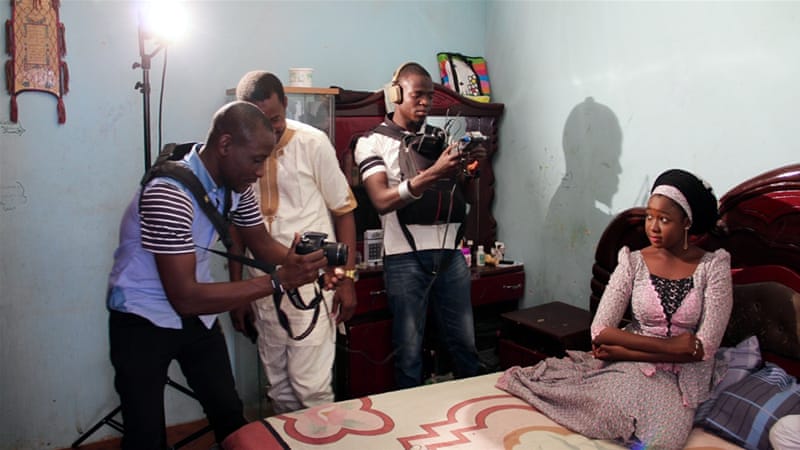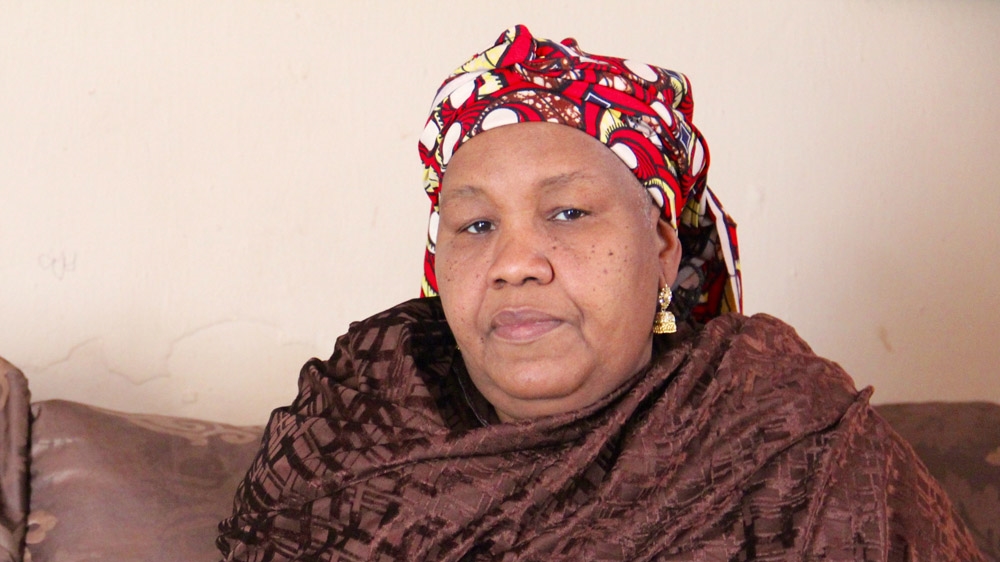Arts & Culture
With the women who are challenging society's expectations and making the industry thrive.

At the age of 22, Fatima Yola (her stage name) has played in tens of movies and is used to the hardships of filmmaking. She also knows the bounds of what is permitted on screen: Even though according to the script the couple are married, the actress keeps her distance from her onscreen husband and carefully avoids touching him.
 |
| Kannywood movies are big sellers in Kano traffic [Femke van Zeijl/Al Jazeera] |
Movies in Hausa, the language of the largest ethnic group in northern Nigeria and the lingua franca in that region, are extremely popular in the predominantly Muslim north. In traffic, the DVDs with their candy-coloured covers are big sellers, and it is not uncommon to see a film crew shooting scenes in the streets of Kano, the largest city in the north.
This
film industry has been coined Kannywood, after the city it originated
in. According to statistics from the National Film and Video Censors
Board, its movies make up about 30 percent of the films produced by the
Nigerian-based film industry popularly called Nollywood, which is often
portrayed as the third-largest in the world, after Hollywood and
Bollywood. Kannywood even has its own TV channel, Africa Magic Hausa,
showing Hausa-language movies on satellite TV.
On a recent Sunday afternoon on Africa Magic Hausa, the first movie, Ladiba, saw the lead character, after whom the film is named, get her daughter's rapist and murderer put behind bars, even though he is the son of a "big man" politician. In one emotional flashback, the mother remembers how perfectly her little girl used to recite verses of the Quran.
The second film features a father who realises his daughter is too precious to marry off to an old chief in the village and decides to put her through school instead. And in the third movie, so enigmatically subtitled that a non-Hausa speaker can only but guess the storyline, the actors occasionally burst into song, accompanied by background dancers in glitzy costumes.
Kannywood treats the viewer to a mishmash of cultural influences. Before the local film industry came into existence in the 1990s, northerners watched Hindi language films from India. The glamour of the Bollywood musicals has rubbed off on the Hausa movies, some of which feature singing and dancing.
Their tone is devoutly Muslim, though, and quite often the very last line of the end credits is "Glory be to God". Many of these movies also denounce the hypocrisy of the ruling classes who preach piousness in public while sinning in private.
Hausa movie plots are often based on soyayya novels, popular local romance novels mainly written and read by women. The love stories - soyayya means love - evolve around relationships and marriage.
They don't shy away from the problems women face in everyday life, such as forced marriage, sexual molestation, the lack of female education, and domestic violence - matters this society is not accustomed to discussing openly.
It is hardly surprising that women, who for the first time see their own experiences reflected in the public domain, form a significant part of Kannywood's audience. They also play a considerable role in the industry itself. According to the Motion Pictures Practitioners Association of Nigeria, 75 percent of the Hausa movie actors are female, as is the case for two-thirds of the association's members - from singers and producers to actors and make-up artists.
These women have one thing in common: they all have to juggle their professional life and their reputation as women in a traditional Islamic society, albeit one that is changing as more and more women begin claiming public space.
Parental approval
Fatima Yola has just rounded up the bedroom scene in her movie, which is called Ankon Biki, after the clothes that wedding guests wear. The young actress recently moved to Kano to be in the hub of the film business. She does not live with her parents any more, which is unusual for an unmarried young woman in these parts.
In the past, most Hausa parents did not support their daughters pursuing a film career, and many of the young unmarried women who started acting had run away from home - sometimes to escape a forced marriage.
 |
| Kannywood actress Halima Ahmed says her parents support her acting career [Femke van Zeijl/Al Jazeera] |
hese days, however, parents are more supportive, says Halima Ahmed, the ingenue in Ankon Biki. She lives in her parental house in Kaduna, a city south of Kano, and says her parents approve of her acting career.
"We like watching movies at home. Now, they even call me when they've seen a trailer that I'm in," she says. "Since my mother approves, I don't care what anyone else says."
The 20-year-old has appeared in about five films, starting as a supporting actress and working her way up. That is why she is not too demanding when it comes to pay, as she explains in between shooting scenes: "I am still building my career, so I take what they offer."
She started acting after she finished Tafawa Balewa Girls Secondary School in her hometown, but hopes eventually to enrol in university. "I want to read law. I am saving what I make with acting for my school fees," she says. Then the director calls her name and she rushes back on to the set.
Fatima Yola has just finished filming - scenes are rarely shot more than once - and comes out of the house to get some fresh air. When asked about her ambitions, she doesn't mention university. Fatima's goal is to get married.
Will she still act after her wedding day? "Of course not. You cannot combine a man and a film career," she says. "Our culture does not support that. If my husband would allow me to keep on filming, it would mean he wouldn't love me. I'd rather stay at home."
As an unwritten rule, women stop acting once they marry. Elderly actresses, therefore, are hard to come by, and the talented ones are in high demand. They turn up in every other Kannywood movie. One of these well-known faces is Hadiza Mohammed, who plays the mother of the leading actress in Ankon Biki.
Elderly characters
Hadiza Mohammed is in her 40s, and only plays elderly characters: mothers, widows, aunts and older sisters. These roles often surpass her age, but she has mastered the art of acting old: once the cameras roll, her voice cracks, her eyelids droop, and she dawdles like an elderly senescent person.
While the crew is preparing the next location off Zoo Road, the street where most of Kano's film-related businesses are located, she has some time to talk.
Hadiza Mohammed is not married and still lives with her parents. The actress can afford to live on her own, she says, but as a single woman, she gets more respect under her father's roof. When she started acting 15 years ago, neighbours and family members tried to persuade her mother to order her to give it up, but she never forced her daughter to do so. "She said, 'I raised you well. Why would you misbehave?'"
The general perception in society has changed since then, and she feels that actors are cast in a better light. "Everyone watches movies nowadays. Kannywood stars are invited to the UK and the US and big companies organise award ceremonies for us."
The fact that she makes a good living, drives her own car and takes care of her parents adds to the respect. "Now, people rush to me when they need help because they think I'm rich," she says with a smirk.
Also, the Kano-based film industry is providing jobs and business to the city, something that went a long way towards improving public opinion of the profession. It helps that major mobile providers such as Glo and MTN have contracted Kannywood stars as their brand ambassadors in multimillion-naira deals.
But that does not mean that Hausa movies are entirely uncontroversial. In fact, not more than 10 years ago, a moralistic backlash triggered by a sex scandal almost destroyed the local film industry. As is often the case in public fights about morality, the female body was the battleground.
Blue movie
In August 2007, a video taken privately on a mobile phone was leaked online. It showed popular Hausa actress Maryam Hiyana having sex with her boyfriend. The video immediately went viral, and the whole of Kano began talking about it as the first Hausa "blue movie". The Kano State Censorship Board (KSCB) hit back with a vengeance.
The Censorship Board came into existence before the scandal in 2001, and is a combined initiative of the local film industry and the state government. It was a response to the adoption of Islamic law in Kano a year earlier.
Under the law, filmmaking was under threat of being abolished altogether. In order to avoid that, Kannywood voluntarily subjected itself to stricter censorship.
This
compromise worked relatively well, until the Hiyana scandal broke out
and a new KSCB executive secretary took it upon himself to "sanitise"
Kannywood.
Nigeria-based researcher Carmen McCain, who has extensively studied Hausa films in Kano, describes in an article about that era how the local censorship crisis drove filmmakers out of the state, as thousands of people in the industry were arrested, fined and sometimes jailed.
 |
| DVDs for the Kano market have to pass through the Kano State Censorship Board [Femke van Zeijl/Al Jazeera] |
She also describes how the public did not quite share the indignation: Maryam Hiyana became an unexpected champion among young people who disliked how she was being victimised. Until today, some cars in Kano feature faded stickers bearing Hiyana's face.
The overly zealous KSCB executive lost his moral authority when the police caught him in a compromising situation with a young girl in his car, and Kannywood celebrated when, in 2011, the newly elected governor appointed a new head of the Censorship Board.
Preserving Hausa culture
"That's all in the past. Things have gone back to normal now," says Isma'el Muhammad Na Abba about the 2007-2011 Kannywood crackdown. He is the current executive secretary of the KSCB, and used to be a filmmaker himself. He describes the task of the board as "preserving Hausa culture".
What does that entail exactly? "We don't like to see body contact between men and women. No handshaking, let alone kissing," he says. "And no nudity or transparent dresses." The general secretary explains how things such as prostitution, lesbianism and adultery may be portrayed, as long as it is clear to the audience that they are unacceptable. Song and dance are permissible, as long as there is no physical contact between the sexes.
 |
| Films are reviewed several times before they make it to the marketplace [Femke van Zeijl/Al Jazeera] |
The secretary-general defines the average of two or three corrections per film the board requires as minimal interference. Furthermore, he argues, since he took charge five months ago, not a single movie has been rejected, proving the industry and the board are no longer on a collision course. "Filmmakers themselves understand they have a task to educate people and cannot go against society," he says.
Empowering messages
Censorship or not, Kannywood movies do transmit empowering messages to a female audience. That is the opinion of sociologist Fatima Adamu of the Usmanu Danfodiyo University in Sokoto, northwest of Kano. She observes how storylines are "testing the waters" to see how far they can "push society's boundaries".
She takes as an example a film in which a woman resists her husband's wish to bring in another wife. The liberating message here, says the sociologist, is that resistance is possible in a society where women are often expected to accept a husband's decision. "They say, 'Yes, you can fight,'" she says.
Actresses openly showing their beauty also is emancipating in a society where female beauty is supposed to be hidden, she adds. "It shows women: Your body is yours alone, and you can do with it what you want."
Adamu
doesn't feel that the occasional retaliations against Kannywood are
supported by the audience. "It's the masses who watch Kannywood movies,
not the elite. The general public is more ready for social change than
political and religious leaders."
 |
| Producer Umma Ali says she finds it hard to get funding for her films [Femke van Zeijl/Al Jazeera] |
Even 57-year-old producer Umma Ali had to sneak out of her house for the interview. When she started filming 18 years ago, she says, men couldn't cope with a woman being in charge. Until now, most female producers work with a male assistant to get things done on the ground.
The producer does feel that she and her female colleagues have made a difference in Kannywood, though. "Our films address different issues from the movies men make. Men used to dismiss problems like domestic violence. We put that on the map."
And, she says, film crews are very happy to work under a female producer. "We treat our people better. Male producers sometimes do not even provide lunch for their crew. That's why actors beg me to be cast in my movies. They know they will eat good food."
WATCH: Welcome to Nollywood
Hooray for Nollywood: Nigerian film industry raises the artistic bar
Source: Al Jazeera


No comments:
Post a Comment